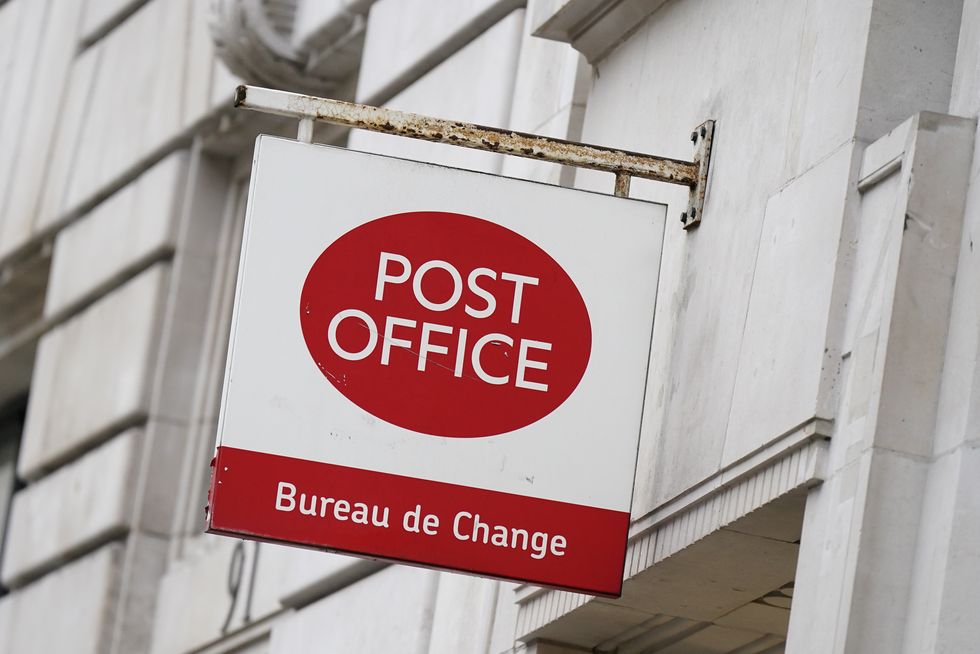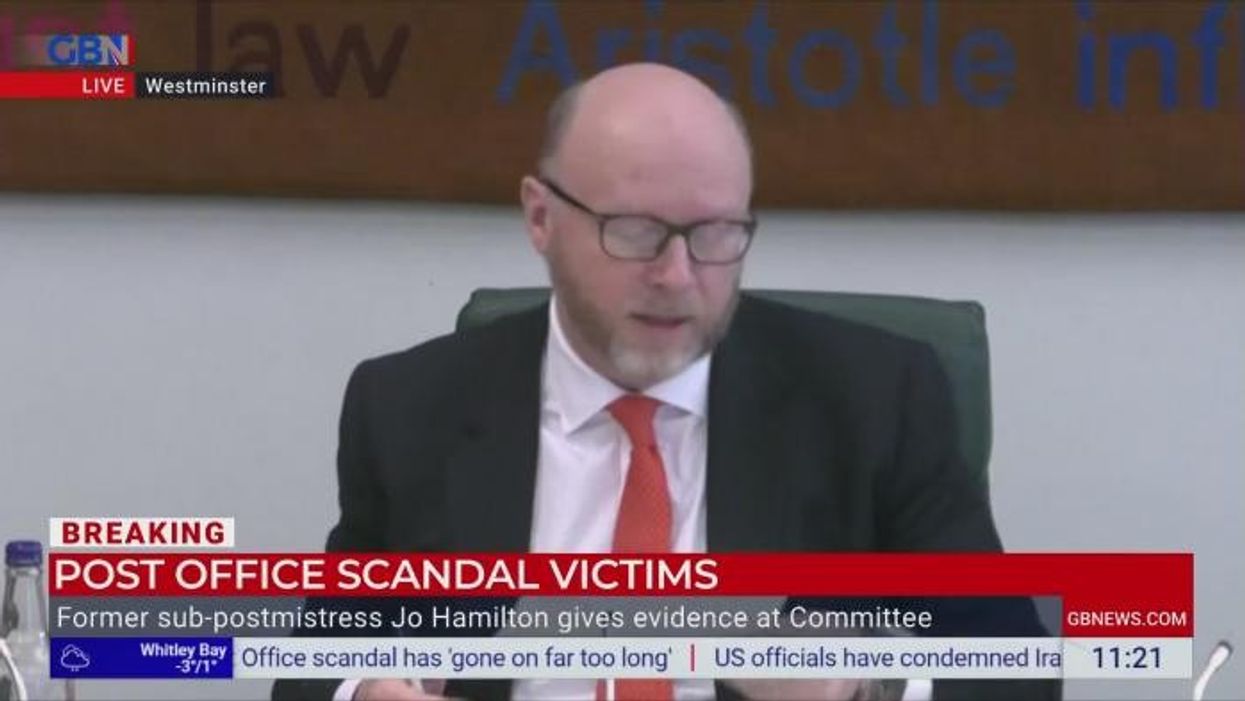'Post Office was meant to bring a secure future but I hit rock bottom and lost £250,000 in Horizon scandal'

A former sub-postmaster who lost hundreds of thousands of pounds and faced years of worry in the Post Office Horizon scandal says he “counts himself as one of the lucky ones”
Don't Miss
Most Read
Taking on a village shop and Post Office in Leicestershire was expected to offer a “more secure future” for DPV, then 33, and his young family.
Moving 100 miles away from loved ones was not an easy decision, but he’d seen setting up a shop had become a “good living” for relatives also in the industry. “It’s hard but it’s comfortable,” he told GB News.
At the time, in 2012, DPV, who has asked to remain anonymous, could get a salary from Post Office, and alongside income from his shop, DPV hoped he could provide for his children.
DPV told GB News: “We’d been married a few years. I’ve always liked retail and I thought I could do well with a shop and Post Office inside it. Post Office was a bonus because it was a monthly salary coming in.”
They found a premises they could afford, but it meant leaving their hometown. The opportunity was “daunting”, DPV recalled, but he was excited: "It was my own business. Something I could grow myself and it was on me, which was what I wanted.”
Sadly, as for hundreds of sub-postmasters and postmistresses hit by the Post Office Horizon scandal, it turned out to lead to years of worry, stress and financial devastation.
DPV passed the two interviews he had with Post Office, and a month before the takeover, he had a week of training. It took place in an office which was full of other future sub-postmasters, who were also buying Post Office businesses.

The village shop and Post Office was meant to offer former sub-postmaster DPV a "more secure future"
|GETTY
“It was very daunting because as soon as you start the training, you suddenly realise how difficult this is going to be,” he said. “Running a Post Office has been described as a lot more complicated than running a bank. It’s on another scale. You’re not just looking after your Post Office, you’re looking after your shop as well.”
DPV was reassured that a Post Office trainer would be with him throughout the opening hours for the first two weeks after take over. “Then they talk about the helpline, but that’s just a completely different kettle of fish.”
Reflecting on his induction, DPV thinks sub-postmasters need a minimum of one-month of training and another month of someone supervising them at the counter.
As a sub-postmaster, DPV had to do the balance – of cash and of stock - at least once a month on Horizon, known as a TP [Trading Period], but an auditor told him to do it at the end of the week.
He remembered: “There’s no one with you for your first TP. The colossal amount of paperwork while you’re doing it can be harrowing, even for people who are educated and come from a financial background.
“It’s difficult to run a Post Office. It’s the back-office end - when you close and put the blinds down, and start counting everything - that’s where the nightmares start.”
A month in, the sub-postmaster did his first TP rollover. He was £40 short. DPV did the numbers and recounted everything again.
“You blame yourself, in the beginning," he said. “You automatically think, ‘Ok, I must have given a £20 note to someone instead of a £10 note.’ But you slowly start to realise it’s not you, as the shortfalls start to get larger and larger.”
DPV remembers his trainer telling him to “count himself lucky” when he heard the amount he was down by. “I thought, ‘What do you mean? I’m £40 down – where is that £40?’
“I never forgot his words, when he said, ‘There will be many, many postmasters ringing today with a lot more missing than £40. So, count yourself lucky.
“I thought that was the start of something that I don’t know about. That was not good.”
The next few TPs were fine, DPV said, explaining he was short slightly but not by much. “I just took it out of my own pocket,” he said.
He had heard a lot of sub-postmasters would put extra funds in when cashing up each day. “It’s when you don’t do it daily that you see it’s got to hundreds.”
Around six months later, DVP’s TP showed he was £22,000 short. A week earlier, he was down by just a couple of hundred pounds.
He rang the helpline, who told him to press “settle centrally”, which flagged up an audit.
“I was told to leave it in the suspense account, carry on the following day, and wait for a phone call or a visit from a Post Office worker to come and help. But, there was no help, there were auditors.”
When the auditors came a few days later, DPV felt a sense of relief. “I thought, ‘Ok, they can come and sort it out because obviously I’ve done something wrong somewhere.”
Things went bad to worse, as the auditors found DPV was down by £24,000 instead.
They called his contracts adviser and DPV was suspended from running the Post Office within his shop.
“It was like my world had fallen apart,” he said.
A Post Office serviceman, who provided relief work, came to continue running the Post Office while the investigation continued.
DPV was called into an interview under caution. He was advised to bring a lawyer. “I said, ‘I’ve done nothing wrong. I don’t have the money to hire a solicitor.’ At that time you don’t realise you could be prosecuted by them.”
DPV says his answers were ‘dismissed’ during the recorded interview.
“They said that as I’d just bought a shop, I must be in debt. They asked, ‘Was I in financial trouble?’ I said, ‘I’m not in financial trouble but the Post Office is always short of money and I’m having to put money in from my shop to balance your books.’”
DPV said they asked where he kept his takings, and to take them there.
“They then followed me home to the flat where my safe is. One of them made a comment about me not having spent money on doing my flat up. That really upset me. My flat needed repairs and decorating but we were not in a position financially yet to do it so we made do.
“They didn’t stop telling me that I had to pay this money back.”
DPV gave them thousands of pounds of shop takings from his safe.
LATEST DEVELOPMENTS:

The former sub-postmaster says he was in "constant fear" after his Post Office suspension was lifted
|PA
“At that moment, I thought to myself that this is not an organisation that’s working properly,” he said. “They took £8,000 of my takings in cash and just put it in a bag. I couldn’t believe what I was seeing.”
An auditor arrived the following week and took another significant chunk of the money from DPV’s shop takings, leaving him short on his direct debit for stock deliveries.
He then had to speak to his contracts adviser about getting his Post Office suspension lifted. “I couldn’t stop crying throughout that interview. I pleaded for my Post Office back. I said there had to be a mistake I had made, and I needed more training. She decided to give me another chance.”
DPV's suspension was lifted, but from then on, he was in “constant fear” every day.
“I was lucky that I had a busy shop,” he said. “A lot of these people that have come forward have lost everything because they can’t afford to run the business. My shop was really busy so it could swallow up the losses.
“The losses were getting larger every time I did a balance - £500, or £600 or £800 each week. I’d take it from the shop, put it in and start again. That became the norm for years.
“The issue you’ve got with something like this is the snowball effect it has on everything else because you don’t have enough money sometimes to pay your normal bills. I could never pay my tax bill on time.
“You are taking a certain amount of money in the shop, which your accountant is then giving you a tax bill you need to pay. But half of that you’ve given to Post Office – you don’t even have the money to pay the tax. You can’t keep up with everything. It was very tough.”
DPV’s struggle felt even harder as a loved one who also ran a Post Office did not encounter problems. “It made it worse for me. These people were progressing, and I was stuck in a rut. No one believed me and no one believed my wife. It was hard. It wasn’t easy.”
“Financial worry is the worst worry, especially when it’s not your fault and no one believes you. Where do you go for help?”

The couple decided to relocate the Post Office as it seemed like a good business opportunity
|PA
Following his suspension having been lifted, DPV decided he wouldn’t ring the helpline again. “When I called them that time, the shortage had increased. I couldn’t afford to ring them in case it doubled,” he said. “There was no help.”
A few years later, an opportunity came up to purchase a disused pub nearby and the couple decided to turn it into a shop and relocate.
“It had a car park, the village was growing and getting busier, and I thought this was a good opportunity.
“That was where everything got worse.”
Responsible for covering the cost of moving a Post Office site, the couple spent just shy of £30,000 on the relocation. “It was colossal, but we were doing it for a long-term investment," he said.
“If everything ran fine, it would have paid its way in a few years. It was a lovely store and we moved everything down.”
They opened up in the spring of 2017 and the new shop was “thoroughly busy”. However, the relocation meant DPV’s Post Office was upgraded to a later version of Horizon, which led to “major issues”.
Every month, the Post Office TP was short by several thousands of pounds.
“We would also get random transaction corrections,” DPV remembered.
“You correct it… you put the money in. But when your discrepancy is that low, it will flag up an audit.”
In winter that year, they had their first audit. DPV told the auditor: "There has got to be something wrong with Horizon." The auditor insisted there wasn’t an issue, and pressed on with the task.
The audit found DPV was down £800. But just the day before, the weekly balance showed he was £300 down. “It was really weird. This was done at the end of the day. I hadn’t traded. I said to him, ‘How has it increased by £500?’
WATCH NOW: Mr Bates vs The Post Office trailer
The auditor suggested DPV wipe the slate clean and pay the amount missing. He did. After the auditor left, DPV opened his Post Office again, but just five hours later, his end-of-day balance showed he was £500 short again.
With so much money “going down the pan”, DPV says he “started hitting rock bottom”.
The following month, Post Office contacted him to say his Christmas stamps hadn’t been ‘remmed’ in.
“I rang them. I said, ‘I know how to ‘rem’ stamps. I’ve been doing this for six years,'” he recalled.
DPV followed their instructions. That day, his balance showed a £19,000 loss.
“I thought there has got to be a reason for this. I must have ‘remmed’ them in. If you ‘rem’ them in twice then it means you've got all that stock, but you haven't got the stock, so that's why the money is short.”
It flagged up another audit.
This time, auditors found a loss of £56,000 – a mixture of £36,000 and more than £19,000 in stamps.
“That’s when I lost the Post Office,” he said. “I was just in a daze. My thoughts weren’t there. I didn’t know what to do.
“When it shut, I said to myself, I’m not ever opening this up again. It was the biggest relief ever, knowing I wasn’t going to open it. But at the same time, I was getting demands for the money.”
DPV remembers the Bates vs Post Office case – whose story has been serialised in ITV drama Mr Bates vs The Post Office - was beginning around this time, and got in touch via Alan Bates’ website.
He says he was advised not to pay the money to Post Office. “I told them I couldn’t pay it and that was the last I heard from them.”
DPV estimates he has lost more than £250,000, and it’s had a significant effect on his life.
He said: “It’s had a massive impact on me – on my health, my marriage, my family.
“People don’t believe you, so you keep your head down and you say nothing. Years later, when it eventually did come out, the hurt was already done.”
He got some compensation through the Horizon Shortfall Scheme, but it’s nothing close to what he’s lost.
He said: “The issue with the compensation is a lot of people would have taken it because they were desperate.
“You were able to say no to it and it would have gone on to be reassessed, but we needed the money.
“We accepted it because we wanted closure but there’s just no closure.
“People have lost everything because of the snowball effect that this has caused.
“No amount of money can ever pay for the years of daily suffering you go through. The suffering your partner goes through. The sleepless nights, stress and anxiety are never compensated for your reputation in tatters.
“I hate them. Once a national treasure…. Post Office now is a national disaster.”
A Post Office spokesperson said: "We are deeply sorry for past wrongs and to hear this former Postmaster's experience. The Horizon Shortfall Scheme was established in 2020 specifically to provide redress for Postmasters and all claims are assessed by an independent panel before an offer is made."











